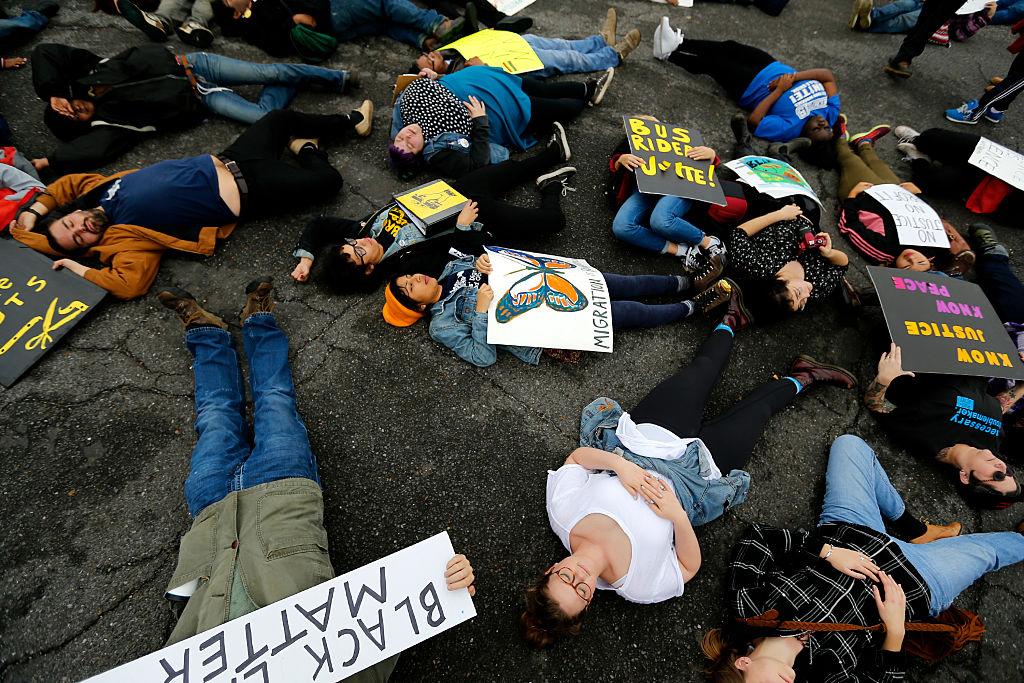Memphis Police Collected Black Lives Matter Activists’ Private Facebook Posts
Police appear to have used a fake Facebook account to ‘friend’ activists and archive who ‘liked’ their posts.

Documents newly released by the City of Memphis in response to an ACLU of Tennessee lawsuit reveal how precisely police tracked Black Lives Matter activists on social media in 2016 and 2017. The social media spying was led by the police department’s Office of Homeland Security, a unit created after the September 11, 2001, attacks.
The documents include a PowerPoint presentation, entitled “Blue Suede Shoes,” on Black Lives Matter activists who had gathered at a bridge and at an Elvis Presley vigil to protest the police shooting of Memphis teenager Darrius Stewart. The presentation, circulated to the Memphis Police Department command staff, includes the names and faces of activists who had been previously arrested at Black Lives Matter protests.
The presentation goes into detail about activists’ contacts and how they were arrested. The slideshow also paints the activists as radicals and quotes the leftist organizing theorist Saul Alinksy, implying that the activists were using Alinksy’s tactics to “hijack” legitimate public groups. (In recent years, Saul Alinksy has become a focus of far-right activists and commentators.)
“The Memphis Police Department has information from various sources that small groups of individuals use these legitimate public venues to advance their own agenda,” noted the slide show, which was labeled “confidential.” “The Memphis Police Department has information from reliable sources that these small groups intend to cause violence and destroy property using these public venues.”
In a court deposition stemming from the ACLU’s lawsuit, the police officer who created the PowerPoint presentation admitted to tracking activists’ associations, including their spouses in one case, and the groups they were involved in, including labor and Palestinian solidarity groups.
Police appear to have used a fake Facebook profile, “Bob Smith,” to befriend and gather information from activists, according to the deposition transcript. During the deposition, when an ACLU attorney asked an officer whether he had other accounts that he used beyond his personal account to track social media posts, his counsel insisted he not answer because that would get “into the details potentially of the Bob Smith account.”
Through such methods, it appears police were able not only to collect public social media posts, but also private ones. According to the deposition transcript, Memphis police obtained a nonpublic Facebook post of an activist who had recommended a Saul Alinsky book. The police then not only collected information on that nonpublic post but the names of 58 friends who “liked” the post.
Following the release of documents, Memphis police director Michael W. Rallings said his “officers have never interfered with anyone lawfully exercising their First Amendment rights,” and claimed that the department “has gone out of its way to ensure all demonstrations, even unlawful unpermitted ones, are allowed to move forward.”
In a statement to The Appeal, ACLU of Tennessee executive director Hedy Weinberg noted that “the public has a right to know about government practices,” especially when it comes to the surveillance of protesters. Weinberg continued, “We are pleased that the documents related to this case have been unsealed, allowing members of the public to see and assess the extensive Memphis police activities for themselves, even as the court considers their constitutionality. We remain committed to ensuring that Tennesseans are able to fully exercise their free speech rights, free from fear or intimidation.”
Memphis police spying on activists has sparked controversy over the last two years. Several activists named in the social media posts have accused police of surveilling their homes and workplaces. Local media also reported on how authorities created a “watch list” of activists after a protest outside the mayor’s home. Memphis police have also conducted surveillance operations against Fight for 15 minimum wage organizers. As Brentin Mock noted in CityLab, such efforts evoke a much deeper history of Memphis police targeting black protesters.
Black Lives Matter activists across the country have been targeted by local and federal spying efforts since the Ferguson, Missouri, protests over the police shooting of Michael Brown in 2014. The Department of Homeland Security tracked Black Lives Matter social media posts extensively in 2015. During Black Lives Matter protests in 2014 and 2015 in New York, police officers accessed activists’ text messages, The Guardian revealed.
Earlier this year, The Intercept broke the news that the FBI had tracked Black Lives Matter activists’ movements across the country and staked out the homes and cars of individuals somehow tied to the protests.
In the Trump era, the FBI has declared what they call “Black Identity Extremist” groups to be a leading domestic terrorism threat, as Foreign Policy first reported. This extremist classification immediately attracted criticism. Black congressional leaders argued it unfairly lumped numerous black groups into one movement threatening law enforcement and cited the FBI’s notorious record of surveilling Black civil rights activists. Since then, FBI agents have visited the homes of Black activists across the country and arrested at least one, whom media outlets have characterized as an individual likely fitting this classification.
